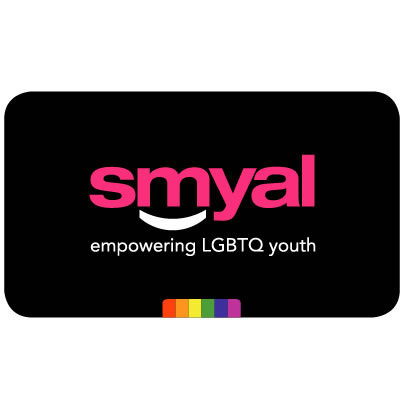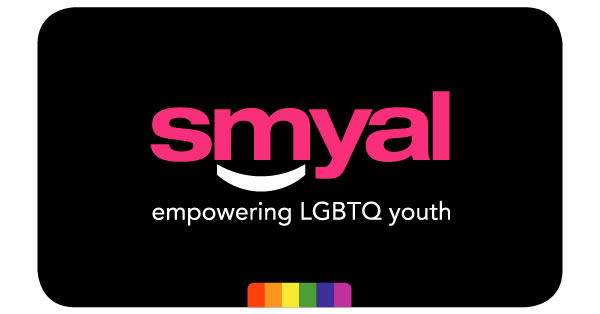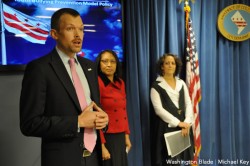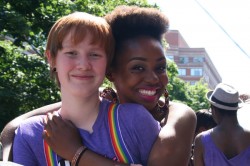Local
D.C. LGBT youth group rebrands itself
Regional GSA network part of SMYAL’s new strategic plan


(Image courtesy of SMYAL)
SMYAL on Thursday unveiled a new logo and acronym as part of its ongoing rebranding efforts.
The organization retired the blue, spiky-haired logo affectionately dubbed “Shannon” and replaced it with one that contains SMYAL in magenta print above a rainbow-colored banner and a slogan that reads “empowering LGBTQ youth.”
SMYAL, which had previously stood for Sexual Minority Youth Assistance League, is now Supporting and Mentoring Youth Advocates and Leaders.
SMYAL Executive Director Andrew Barnett told the Washington Blade in an exclusive interview on Tuesday that young people whom the organization serves and local groups with which it works increasingly found the term “sexual minority” out of touch.
“We want a name that when people see it they say ‘oh, this is something that I see myself in,” Barnett said. “The actual spelling out of the acronym was not something that people identify with anymore.”
SMYAL has worked with 7,500 young LGBT people since 1984

Andrew Barnett, executive director of SMYAL (Washington Blade photo by Michael Key)
A group of advocates and those who work with young people founded SMYAL in 1984 after they organized a conference on LGBT youth issues after they learned cross-dressing students had been admitted to St. Elizabeth’s Hospital in D.C. The organization has subsequently provided direct services to more than 7,500 young LGBT people from the nation’s capital, Prince George’s County in Maryland and other parts of the Washington metropolitan area.
SMYAL in March 2012 adopted a new strategic plan that Barnett said during his organization’s annual Fall Brunch last October would allow it to identify key issues facing LGBT youth and how the organization can most effectively respond to them.
Barnett told the Blade the process of speaking with board members, staffers, clients, funding partners and donors about the new strategic plan began in July 2011. He said SMYAL also sought feedback and suggestions from other community organizations and agencies with which it partners.
“We really wanted to get an accurate and comprehensive picture of SMYAL and LGBTQ youth in the region and what makes sense for us as the next step for our organization,” Barnett said.
Barnett said it quickly became clear SMYAL’s after school programs were providing “really great support for youth.” He added his organization has heard from a lot of young people who said they were interested in attending them.
“At SMYAL we’re providing really great opportunities for youth to engage in social activities with their peers and engage in positive youth development,” Barnett said. “They feel like they’re part of the community [and] ultimately they can grow into happy, healthy and productive adults.”
The average age an LGBT person comes out is 13; but many of them cannot attend SMYAL programs that take place at the organization’s youth center on 7th Street, S.E., near Eastern Market because they are involved with other after-school programs, cannot get to a Metro station or are not ready to come out to their parents.
“We also want to expand our ability to provide programming outside of the four walls of SMYAL,” Barnett said. “We want to bring those safe spaces and opportunities for youth leadership development to other places in our community.”
Barnett further pointed LGBT young people continue to experience disproportionate rates of bullying and harassment in school.
The Gay, Lesbian and Straight Education Network’s 2011 National School Climate Survey reported 81.9 percent of students said their classmates verbally harassed them because of their sexual orientation. Nearly a fifth of them said they were physically assaulted on campus because they are gay.
The GLSEN report also found roughly two-thirds of LGBT students had experienced verbal harassment because of their gender identity and expression — 12.4 percent of them said their classmates physically attacked them at school. Nearly 30 percent of LGBT students said they skipped class at least once because they did not feel safe at school.
GLSEN and other advocates also note LGBT students are more likely to face suspension or other disciplinary actions in school than their straight classmates.
SMYAL launches regional gay-straight alliance network

SMYAL youth (Photo courtesy of SMYAL)
One of the ways SMYAL hopes to expand beyond the organization’s drop-in center near Eastern Market is through its D.C. Regional GSA (Gay-Straight Alliance) Network it launched last month.
Working in collaboration with the San Francisco-based Gay-Straight Alliance Network that coordinates more than 900 GSAs throughout California, the SMYAL initiative seeks to support and strengthen the 77 groups in the D.C. metropolitan area. The organization hopes to achieve this goal through an activist camp in August, its annual GSA conference that takes place each fall and trainings with individual clubs and their members at their schools.
SMYAL in 2011 hosted a GSA Network gathering that drew more than 75 young LGBT advocates and GSA sponsors from 20 states. The organization last November also hosted 78 student leaders from across the region at its first GSA conference.
Barnett is also a member of D.C. Public Schools’ LGBTQ Steering Committee.
“We know that GSAs or gay-straight alliances are really effective ways for us to make schools safer for LGBTQ students,” Barnett said.
He added the D.C. Regional GSA Network takes into account the goal set forth in its new strategic plan to expand its programming beyond its youth center.
“We also saw that there was a huge unmet need throughout our region for youth who weren’t able to access programming at SMYAL,” Barnett said. “They didn’t have access to any other programming.”
Barnett said he feels SMYAL’s rebranding efforts will better position it to expand its reach in the D.C. metropolitan area in the years to come.
“It’s a chance for us to take a big step forward in better meeting the needs of LGBT youth throughout the region, which is at the heart of our mission,” he said.
Maryland
Md. Commission on LGBTQIA+ Affairs released updated student recommendations
LGBTQ students report higher rates of bullying, suicide

The Maryland Commission on LGBTQIA+ Affairs has released updated recommendations on how the state’s schools can support LGBTQ students.
The updated 16-page document outlines eight “actionable recommendations” for Maryland schools, supplemented with data and links to additional resources. The recommendations are:
- Developing and passing a uniform statewide and comprehensive policy aimed at protecting “transgender, nonbinary, and gender expansive students” against discrimination. The recommendation lists minimum requirements for the policy to address: name, pronoun usage, and restroom access.
- Requiring all educators to receive training about the specific needs of LGBTQ students, by trained facilitators. The training’s “core competencies” include instruction on terminology, data, and support for students.
- Implementing LGBTQ-inclusive curricula and preventing book bans. The report highlights a “comprehensive sexual education curriculum” as specifically important in the overall education curriculum. It also states the curriculum will “provide all students with life-saving information about how to protect themselves and others in sexual and romantic situations.”
- Establishing Gender Sexuality Alliances “at all schools and in all grade levels.” This recommendation includes measures on how to adequately establish effective GSAs, such as campaign advertising, and official state resources that outline how to establish and maintain a GSA.
- Providing resources to students’ family members and supporters. This recommendation proposes partnering with local education agencies to provide “culturally responsive, LGBTQIA+ affirming family engagement initiatives.”
- Collecting statewide data on LGBTQ youth. The data on Maryland’s LGBTQ youth population is sparse and non-exhaustive, and this recommendation seeks to collect information to inform policy and programming across the state for LGBTQ youth.
- Hiring a full-time team at the Maryland Department of Education that focuses on LGBTQ student achievement. These employees would have specific duties that include “advising on local and state, and federal policy” as well as developing the LGBTQ curriculum, and organizing the data and family resources.
- Promoting and ensuring awareness of the 2024 guidelines to support LGBTQ students.
The commission has 21 members, with elections every year, and open volunteer positions. It was created in 2021 and amended in 2023 to add more members.
The Governor’s Office of Communication says the commission’s goal is “to serve LGBTQIA+ Marylanders by galvanizing community voices, researching and addressing challenges, and advocating for policies to advance equity and inclusion.”
The commission is tasked with coming up with yearly recommendations. This year’s aim “to ensure that every child can learn in a safe, inclusive, and supportive environment.”
The Human Rights Campaign’s most recent report on LGBTQ youth revealed that 46.1 percent of LGBTQ youth felt unsafe in some school settings. Those numbers are higher for transgender students, with 54.9 percent of them saying they feel unsafe in school.
Maryland’s High School Youth Risk Behavior Survey reveals a disparity in mental health issues and concerns among students who identify as LGBTQ, compared to those who are heterosexual. LGBTQ students report higher rates of bullying, feelings of hopelessness, and suicidal thoughts. Nearly 36 percent of LGBTQ students report they have a suicide plan, and 26.7 percent of respondents say they have attempted to die by suicide.
The commission’s recommendations seek to combat the mental health crisis among the state’s LGBTQ students. They are also a call for local and state governments to work towards implementing them.
Virginia
Va. lawmakers consider partial restoration of Ryan White funds
State Department of Health in 2025 cut $20 million from Part B program

The Virginia General Assembly is considering the partial restoration of HIV funding that the state’s Department of Health cut last year.
The Department of Health in 2025 cut $20 million — or 67 percent of total funding — from the Ryan White Part B program.
The funding cuts started with the Trump-Vance administration passing budget cuts to federal HIV screening and protection programs. Rebate issues between the Virginia Department of Health and the company that provides HIV medications began.
Advocates say the funding cuts have disproportionately impacted lower-income people.
The Ryan White HIV/AIDS Program, a federal program started in 1990, provides medical services, public education, and essential services. Part B offers 21 services, seven of which remained funded after the budget cuts.
Equality Virginia notes “in 2025, a 67 percent reduction severely destabilized HIV services across the commonwealth.”
Virginia lawmakers have approved two bills — House Bill 30 and Senate Bill 30 — that would partially restore the funding. The Ryan White cuts remain a concern among community members.
Both chambers of the General Assembly must review their proposed changes before lawmakers can adopt the bills.
“While these amendments aren’t a full restoration of what community-based organizations lost, this marks a critical step toward stabilizing care for thousands of Virginians living with HIV,” said Equality Virginia Executive Director Narissa Rahaman. “Equality Virginia plans to continue their contact with lawmakers and delegates through the conference and up until the passing of the budget.”
“We appreciate lawmakers from both sides of the aisle who recognized the urgency of this moment and will work to ensure funding remains in the final version signed by the governor,” added Rahaman.
District of Columbia
D.C. Black Pride theme, performers announced at ‘Speakeasy’
Durand Bernarr to headline 2026 programming

The Center for Black Equity held its 2026 DC Black Pride Theme Reveal event at Union Stage on Monday. The evening, a “Speakeasy Happy Hour,” was hosted by Anthony Oakes and featured performances by Lolita Leopard and Keith Angelo. The Center for Black Equity organizes DC Black Pride.
Kenya Hutton, Center for Black Equity president and CEO, spoke following the performances by Leopard and Angelo. Hutton announced this year’s theme for DC Black Pride: “New Black Renaissance.”
Performers for 2026 DC Black Pride were announced to be Bang Garcon, Be Steadwell, Jay Columbus, Bennu Byrd, Rue Pratt and Akeem Woods.
Singer-songwriter Durand Bernarr was announced as the headliner for the 2026 festivities. Bernerr gave brief remarks through a video played on the screen at the stage.
DC Black Pride is scheduled for May 22-25. For more information on DC Black Pride, visit dcblackpride.org.
















